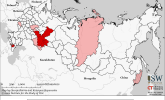Russian Offensive Campaign Assessment, July 18
July 18, 2022 - ISW Press
Russian Defense Minister Sergey Shoigu’s July 18 meeting with the commander of the Eastern group of forces Lieutenant General Rustam Muradov supports ISW’s assessment that Moscow will not prioritize an attack to seize Slovyansk in this stage of the operation but will instead focus on seizing Siversk and Bakhmut. The Russian Ministry of Defense (MoD) announced on July 18 that Shoigu inspected the Eastern group and directed Muradov to prioritize the destruction of Ukrainian long-range missiles and artillery systems. This is the first time ISW has observed explicit mention of the Eastern force grouping operating in Ukraine in this phase of the war. The Russian MoD previously reported that the Central and Southern force groups took part in the capture of Luhansk Oblast under the leadership of Colonel General Aleksandr Lapin and Army General Sergey Surovikin. The Eastern group of forces is likely comprised of elements of the Russian Eastern Military District (EMD), which have been active along the Izyum axis in Kharkiv Oblast. It is still unclear whether Muradov also directly controls operations around Kharkiv City. Muradov‘s forces are operating in the Izyum-Slovyansk direction ostensibly with the objective of eventually seizing Slovyansk itself, and it is noteworthy that Shoigu did not direct Muradov to prioritize taking ground along this axis at this time. Muradov holds a lower rank than both Lapin and Surovikin, suggesting that the Kremlin considers the Izyum-Slovyansk area to be a lower priority than capturing territory in Donetsk Oblast as part of the wider Donbas campaign. The Kremlin likely is focusing military resources and high-rank leadership on localized and discrete gains around Siversk and Bakhmut, despite Shoigu’s earlier calls for the intensification of operations along all axes of advance.









